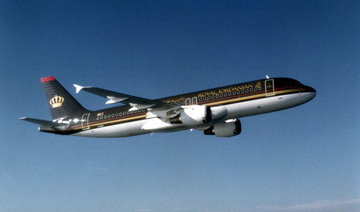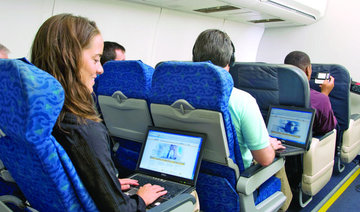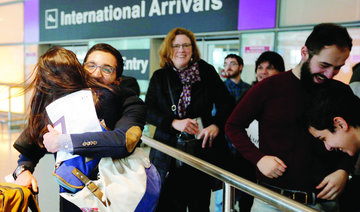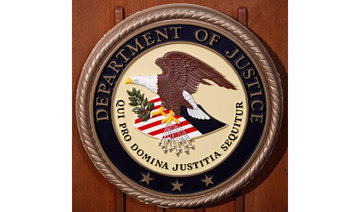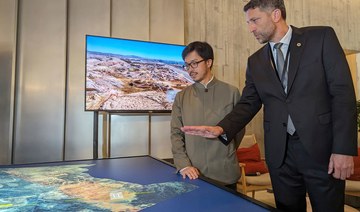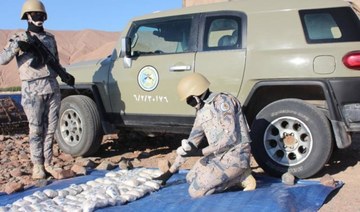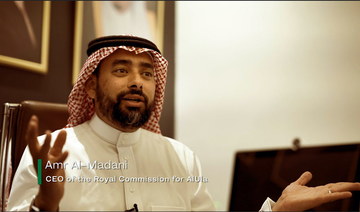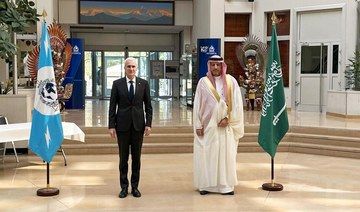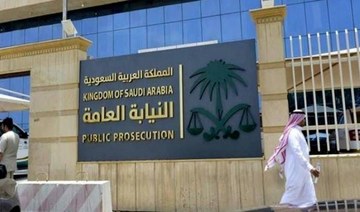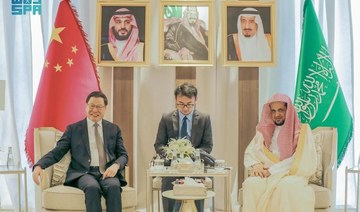JEDDAH: Thousands of passengers traveling on nonstop flights to the US from Saudi Arabia and seven other Middle Eastern and North African countries are now banned from carrying electronic devices on board.
The ban, issued by the US Department of Transportation, targets 10 international airports. It is set to exclude smartphones on board, but will apply to laptops, tablets, portable DVD players, electronic readers and cameras.
Following a similar move, the UK is due to announce a ban on laptops and other electronics on certain flights, the BBC reported, adding that the “UK restrictions may differ from the US Department of Homeland Security’s ban.”
Saudi Airlines (Saudia), which operates nonstop US-bound flights from King Abdulaziz International Airport in Jeddah and King Khalid International Airport in Riyadh, received the information from the General Authority of Civil Aviation, and will abide by the new laws as of Wednesday.
“The US transportation authorities have implemented new procedures on US-bound flights which include taking any laptops, iPads and Kindles (electronic readers), with their carry-on baggage,” Saudia said in a statement sent to Arab News. “These devices can be accepted as part of checked-in luggage only.”
Saudia spokesman Mansour Al-Badr told Arab News: “We do not know the reasons behind the ban.”
A Homeland Security statement sent by the US Embassy in Riyadh to Arab News on Tuesday said the “US Government is concerned about terrorists’ ongoing interest in targeting commercial aviation, including transportation hubs over the past two years.”
The statement cites the 2015 airliner downing in Egypt, the attempted airliner downing in Somalia last year, and the 2016 armed attacks against airports in Brussels and Istanbul.
“Evaluated intelligence indicates that terrorist groups continue to target commercial aviation, to include smuggling explosive devices in various consumer items,” the statement said. The Transportation Security Administration (TSA) has determined that it was “prudent to enhance security.”
The ban applies to nonstop flights to the US from international airports in the cities of Riyadh, Jeddah, Dubai, Abu Dhabi, Cairo, Amman, Kuwait City, Casablanca, Doha and Istanbul. About 50 daily flights will be affected, an unnamed US official told the Associated Press (AP).
The Homeland Security statement said airlines flying from the 10 determined airports were notified on March 21 at 8 a.m. (EDT) and expected to comply within 96 hours.
The UAE’s Emirates, which flies to New York, Washington, Chicago and Los Angeles, told AP on Tuesday that the ban would take effect on Saturday.
Egyptian officials at Cairo International Airport said they did not receive any instructions to ban passengers from carrying laptops, tablets and cameras on board, AP reported on Tuesday.
Royal Jordanian airlines previously issued a statement on Twitter instructing its passengers to abide by the electronics ban, before deleting it later, posting: “Further updates will be announced soon regarding #electronicsban.”
“I’m really still not convinced with this new law,” Zeina Sharawi, a Saudi Ph.D. candidate in Washington DC, told Arab News. She said using electronic devices is routine on long-haul flights, especially when flying with children.
“I’m really worried about putting my laptop in the baggage and have it get damaged or stolen, since I have all my important files and research articles, personal pictures and videos in it. I’d rather if they inspect it at the airport and keep it on board with me instead of keeping it in the baggage.”
Anas Abbas, a Jordanian studying English literature in Minnesota, told Arab News that he might resort to sending his electronic valuables via a secure parcel delivery service instead of packing them in his suitcase: “Instead of having my precious devices (checked in), as traveling without them is impossible and the chance of getting them lost is irritating… I might use DHL to receive them without any possibility of losing any bag.”
An alternative solution to bypass the new procedure is to have a layover at an airport in Europe on the way to the US. Abbas said if he is traveling from Amman, he could book a flight to Paris, for example, before connecting to a flight to the US. “That way I can get all my devices in my (carry-on) luggage.”
US bans electronic devices on flights from eight Middle Eastern countries
US bans electronic devices on flights from eight Middle Eastern countries
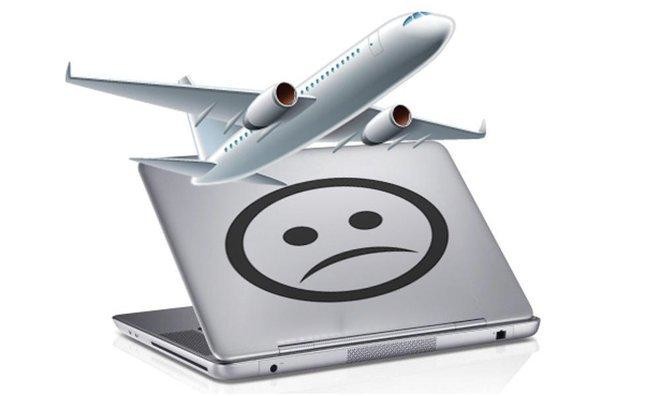
Hareed Festival: A window into the heart of the Farasan Islands

- Annual event highlights tourism potential
Riyadh: The Farasan Islands, a string of coral islands nestled 40 km off the coast of Jazan in the Red Sea, have been abuzz with activity recently as they hosted the 20th Hareed Festival.
This vibrant annual event celebrates the arrival of parrotfish, also called hareed, in the islands’ shallow waters, the Saudi Press Agency reported on Sunday.
The islanders have cherished this event for generations, transforming it into a social gathering that goes well beyond the arrival of the fish.

Visitors to the festival got a glimpse of the islands’ rich cultural heritage as it showcased the area’s unique customs, traditions, folk games, and handicrafts. It also focused its spotlight on Farasan’s remarkable tourism potential and historic sites.
Al-Dana provides one of the highlights. It is a captivating form of vocal art that is one of Farasan’s oldest folk traditions. It forms a poignant expression of longing, a result of the hardships endured by sailors on extended pearl-diving expeditions. The challenges faced by these brave men fueled the art form, which is deeply rooted in Farasan’s cultural identity.
The annual festival also gives an opportunity for Farasan residents to display their traditional handicrafts. Visitors can watch the making of fishing traps and nets, the intricate weaving of palm fronds, the creation of bags and rugs, and hat knitting.
A designated area at the hareed fishing site catered to families and children. Visitors could experience the thrill of catching parrotfish using a traditional method that involved setting up barriers to prevent the fish from escaping. This competition, a centuries-old tradition, allowed families to connect with the region’s fishing heritage.

Farasan’s most renowned tourist attractions highlighted the islands’ potential for tourism.
Al-Qassar village, which is located only 5 km from Farasan Grand Island, is a popular tourist site. This heritage village, which is built of stone and palm leaves, is home to the archipelago’s largest palm oasis.
Al-Qassar has served as a summer retreat for Farasan residents. People travel by camel to spend a three-month break in the village during the season of Al-Asef, the northwestern summer wind that comes after the hareed fishing season.
Famous for its abundance of fresh groundwater, Al-Qassar village comprises around 400 houses. These unique dwellings, with stone walls and roofs made of palm tree planks, leaves, doum palm, or anisotes trisulcus branches, topped with algae and mud, are made by traditional building techniques designed to withstand the elements.
The Hareed Festival is a window into the heart and soul of the inhabitants of the Farasan Islands; a celebration of culture, tradition, and the islands’ natural beauty.
Saudi Border Guard arrest 4 attempting to smuggle qat
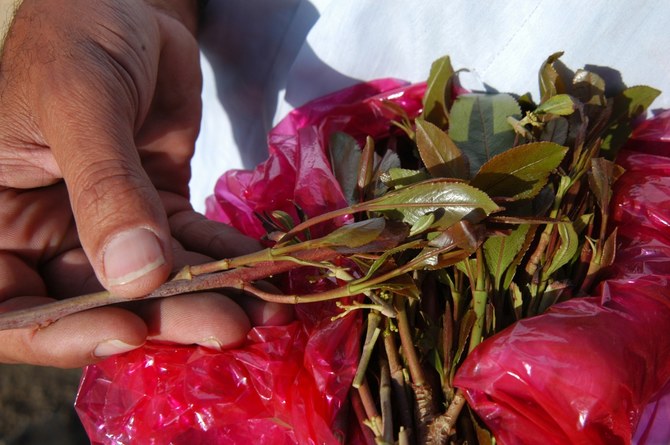
JAZAN: The Kingdom’s Border Guard in Al-Ardah, Jazan, recently arrested four Yemeni nationals attempting to smuggle 80 kg of qat into the country, the Saudi Press Agency reported on Monday.
Mostly chewed by users, Qat is a mild stimulant and illegal across most of the Arab world.
The government has urged citizens and residents to report any information they have regarding drug smuggling or sales to the General Directorate of Narcotics Control. Reports can be made by calling 911 for Makkah, Riyadh and the Eastern Province, and 999 for other regions. Alternatively, information can be emailed to [email protected]. All reports are treated confidentially.
KSrelief distributes food in Pakistan, drills solar-powered wells in Nigeria

DUBAI: KSrelief, Saudi Arabia’s aid agency, recently distributed 370 food baskets in the flood-hit Shangla district of Khyber Pakhtunkhwa province, Pakistan, benefiting 2,590 individuals.
The aid was a part of the fourth phase of the Kingdom’s Food Security Support Project in Pakistan 2024.
Last week, KSrelief, in collaboration with a civil society organization, initiated a project to drill six solar-powered medium-depth water wells in Kwara State, Nigeria. The wells, each at a depth of about 80 meters and equipped with tanks holding 5,000 liters, are for the benefit of 30,000 individuals.
The beneficiaries lauded Saudi Arabia for addressing their vital water needs.
Saudi anti-corruption authority reveals details of recent cases

- Spokesman said legal procedures had been initiated against all perpetrators
RIYADH: A spokesman for Saudi Arabia’s Oversight and Anti-Corruption Authority, also known as Nazaha, revealed on Sunday details of a number of criminal cases it recently investigated and prosecuted.
Outlining 20 of the most prominent corruption cases, he said legal procedures had been initiated against all perpetrators.
In one case, two Central Bank employees were arrested for receiving sums of money from a resident, who was also arrested, in exchange for depositing more than SR7.3 million ($1.95 million), without verifying the source, into bank accounts belonging to commercial entities over a two-year period.
In another case, a security officer working at the General Department of Traffic was arrested for receiving SR387,000 from the owner of a public services office, who was also arrested, in exchange for illegally amending the essential data of a group of vehicles.
One of the cases also highlighted involved an employee working at a university hospital who was arrested for receiving SR100,000 from citizens in exchange for a promise to employ them at the university.
Nazaha said it continues to work to identify and prosecute anyone in the Kingdom involved in the embezzlement of public funds, guilty of abuse of power and position for personal gain, or otherwise harming the public interest.
It stressed that guilty parties will be pursued and held accountable, and that there is no statute of limitations on such crimes.
Saudi, Bahraini public prosecutor meet in Manama
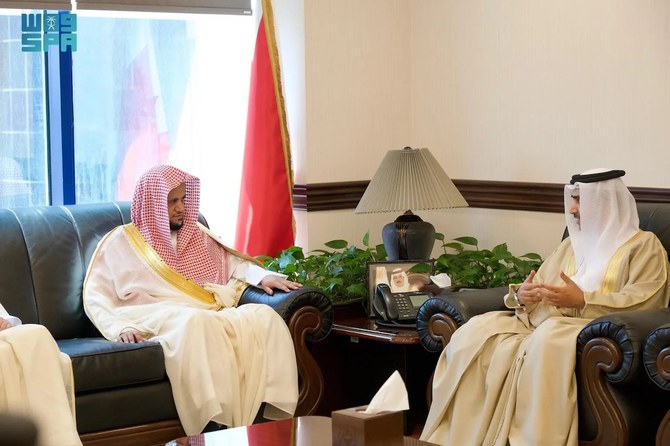
- Al-Mujeb highlighted the unwavering support the Kingdom's public prosecution receives from its leadership
RIYADH: Saudi Public Prosecutor Sheikh Saud bin Abdullah Al-Mujeb met with his Bahraini counterpart Ali bin Fadl Al Buainain in Manama, Saudi Press Agency reported on Sunday.
Al-Buainain welcomed Al-Mujeb and his accompanying delegation and expressed his delight at the visit, which he said signified the ongoing exchange of visits between the judicial bodies of the two nations and the sustained collaboration in combating transnational crime.
During the meeting, Al-Mujeb emphasized the deep-rooted historical ties between the Bahrain and the Kingdom and their continued advancement across various sectors, particularly in parliamentary cooperation and the exchange of information to ensure regional security.
He highlighted the unwavering support the Kingdom's public prosecution receives from its leadership, which he said enhanced the efficiency of its judicial processes.


